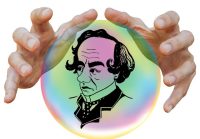甲の薬は乙の…

甲の薬は乙の毒。(日本の諺) / 一人の人にはごちそうになるものが他の人には毒になる。 More »

甲の薬は乙の毒。(日本の諺) / 一人の人にはごちそうになるものが他の人には毒になる。 More »

To be wise and love exceeds man’s might. – William Shakespeare (1564 – 1616): Troilus and Cressida More »

賢明さと恋心の両立は人力の及ばぬところ。 – ウィリアム・シェイクスピア (1564 – 1616): 『トロイラスとクレシダ』 More »

堅実な人は必然を確信し、気まぐれな人は偶然に頼る。 – ベンジャミン・ディズレーリ (1804 – 81) More »
![IMAGE: He who laughs on Friday shall weep on Sunday. [Fr. Tel qui rit vendredi, dimanche pleurera.]](https://www.ok312.net/wp-content/uploads/2018/02/silhouette-702191_640-200x141.jpg)
He who laughs on Friday shall weep on Sunday. [Fr. Tel qui rit vendredi, dimanche pleurera.] – Jean Racine [Jean-Baptiste Racine] (1639 – 99): Les Plaideurs [The Litigants] More »
![IMAGE: He who laughs on Friday shall weep on Sunday. [Fr. Tel qui rit vendredi, dimanche pleurera.]](https://www.ok312.net/wp-content/uploads/2018/02/silhouette-702191_640-200x141.jpg)
金曜日に笑う者は日曜日に泣くであろう。 – ジャン・ラシーヌ[ジャン・バティスト・ラシーヌ] (1639 – 99): 『訴訟狂』 More »
![IMAGE: Two dogs strive for a bone and a third runs away with it. [Two dogs fight for a bone and a third runs away with it.]](https://www.ok312.net/wp-content/uploads/2018/01/fisherman-829814_640-200x133.jpg)
Two dogs strive for a bone and a third runs away with it. [Two dogs fight for a bone and a third runs away with it.] More »
![IMAGE: Two dogs strive for a bone and a third runs away with it. [Two dogs fight for a bone and a third runs away with it.]](https://www.ok312.net/wp-content/uploads/2018/01/fisherman-829814_640-200x133.jpg)
漁夫の利(ぎょふのり)。[漁父の利。] – 劉向(りゅうきょう) (紀元前77 – 前6): 『戦国策』燕策(えんさく)(中国~日本の諺) / (鷸(しぎ)が蚌(どぶがい)を食べようとして嘴(くちばし)を挟まれたところに漁師が通りがかって両方捕まえたという故事から、二者の争いに乗じて第三者が労せずして利益をさらうこと。) / 二匹の犬が骨を争う隙(すき)に、別の犬がその骨を銜えて(くわえて)逃げ去る。 More »
![IMAGE: Jack of all trades and master of none. [Jack of all trades is master of none.] / He who commences many things finishes but few.](https://www.ok312.net/wp-content/uploads/2018/01/shoes_figure_pottery_manufacture-of-bells_640-200x132.jpg)
Jack of all trades and master of none. [Jack of all trades is master of none.] / He who commences many things finishes but few. More »
![IMAGE: Jack of all trades and master of none. [Jack of all trades is master of none.] / He who commences many things finishes but few.](https://www.ok312.net/wp-content/uploads/2018/01/shoes_figure_pottery_manufacture-of-bells_640-200x132.jpg)
何でも来いに名人なし。[多芸は無芸。/器用貧乏。] / あれこれ手をつける者はほとんど中途半端に終わる。 More »